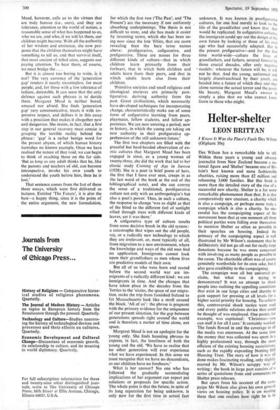Helter-shelter
LEON BRITTAN
I Know It Was the Place's Fault Des Wilson (Oliphant 30s) Des Wilson has a remarkable tale to tell. Within three years a young and obscure journalist from New Zealand became a na- tional figure and 'Shelter' became one of Bri- tain's best known and most fashionable charities, raising more than £2 million and rehousing 3,000 families. But this book is more than the detailed story of the rise of a successful new charity. Shelter is a far more remarkable phenomenon than that. It is that comparatively new creature, a charity which is also a campaign, or perhaps more truly a campaign which is also a charity. So suc- cessful has the campaigning aspect of the movement been that at one moment all three political parties were falling over themselves to mention Shelter as often as possible in their speeches on housing. Indeed the primacy of the campaigning aspect is well illustrated by Mr Wilson's statement that he deliberately did not go all out for really large donations because he was more concerned with involving as many people as possible in the cause. The charitable effort was of course genuinely worthwhile for its own sake, but it also gave credibility to the campaigning.
The campaign won all but universal ac- claim, but what was it trying to demonstrate? It was an attempt to shock people into realising the appalling conditions that exist in our large cities and thereby to gain support for pressing at all levels for a higher social priority for housing. To achieve this, controversial shock tactics were used and every public relations device that could be thought of was employed. One poster, for example, was captioned: 'Christmas—you can stuff it for all I care.' It certainly worked. The funds flowed in and the coverage in all the media was enormous. At the same time the money that was collected was spent in a highly professional way, through the most efficient of the existing housing associations, such as the rapidly expanding Notting Hill Housing Trust. The story of how it was all done makes fascinating reading, only slightly marred by Mr. Wilson's scrappy way of writing: the book in large part consists of a series of quotations from and comments on Shelter press releases.
But apart from his account of the cam- paign Mr Wilson also gives his own general views on housing policy. It is on reading
is to these that one realises how right he
describe himself as a reformer and not a revolutionary. For his suggestions are either so vague as to be highly uncertain in their implications or merely amount to useful ideas which even if implemented could not significantly alter the housing situation. The idea of housing bonds, for example, is an interesting one but, as I understand it, it is merely a means of ensuring that money bor- rowed by the government on advantageous terms to the lender is in fact used for hous- ing. Whether this is the logical, convenient or economically desirable way of increasing the amount of resources going to housing is a big question which Mr Wilson does not really discuss. Similarly the suggestions that there should be more research and that the Minister of Housing should provide 'firm direction' and decide where resources must be concentrated hardly take the debate much further. On the other hand the idea of having special housing associations catering for the particularly vulnerable, such as the disabled, with extra subsidies to help them, is an imaginative concept, although obviously limited in the impact it can make on the total problem.
Nonetheless, the seeds of a more radical approach are to be found in this book, although Mr Wilson does not follow them through. They are to be found when he is defending housing associations against their left wing opponents who consider that they let local authorities off the hook by providing a substituted form of public housing. Mr Wilson answers this objection by explaining that in fact housing associations, by buying property on the open market, are replacing the private landlord, and not the local authority, and enable local authorities to concentrate on slum clearance and building on available land. The reason why housing associations are so important for the maintenance and rehabilitation of our ex- isting property is that 'it is no longer economic for the private landlords to do this if modest rents are charged.' Housing associations are able to do this because they can pass on the benefit-of subsidies they receive.
It is, then, the subsidies that are the key to the problem, and Mr Wilson himself recognises the need to recast them. He is, however, surely unnecessarily pessimistic in denying the private sector any significant future role. For if subsidies were extended, on the basis of need, to tenants in the private sector as well, the private landlord would in effect be in the same position as a housing association is today. In other words it would be possible to charge an economic rent and enable poorer tenants to meet this by the use of subsidies. The implications of doing this are more radical than has so far been generally recognised, for the tenant would then be no better off if housed by the council than if housed by a private landlord. In such a situation the private sector surely would revive, with institutions such as insurance companies investing in housing, as happens in countries such as Holland. The local authorities would then be able to concentrate their resources on slum clearance and urban renewal and rehabilitation on a systematic and massive scale, for they would no longer be the sole providers of subsidised housing. It is only by relieving them of- this burden that their true task canbe performed, and it is only by performing that task that the pro- blems of our cities can be reduced to manageable proportions. Shelter has shown us the horrors of the present, but only government action can make the future a better one.



































 Previous page
Previous page